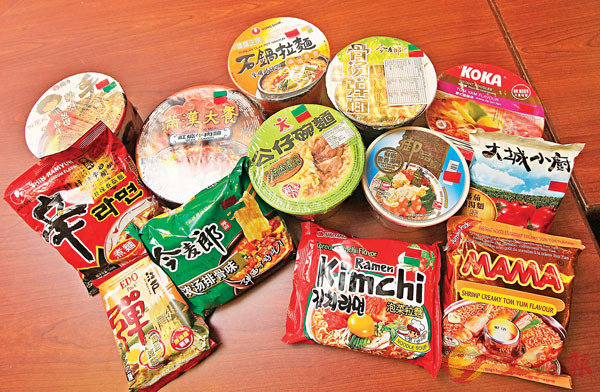 ■兒童以即食麵作為主食不利健康。 資料圖片
■兒童以即食麵作為主食不利健康。 資料圖片【原文】聯合國兒童基金會(United Nations Children's Fund,簡稱UNICEF)昨日發表全球兒童膳食狀況報告,指出全球7億名5歲以下兒童中,約三分一人均存在營養不足(malnourished)或過重(overweight)問題。報告特別指出在東南亞(South-East Asia)地區,雖然經濟起飛、生活質素改善,但不少家長仍不注重子女飲食,倚賴如即食麵(instant noodle)等現代廉價食品,損害孩童健康。
今次報告是UNICEF自1999年以來,首份《世界兒童狀況》(The State of the World's Children)報告,執行主任福爾(Henrietta Fore)指出,若兒童的膳食不佳,其生活質素亦不佳,「我們在健康飲食的競賽上正不斷落後。」報告發現,1990年至2015年間,貧窮國家的發育遲緩(stunted)兒童人數減少近40%,但仍有1.49億名4歲以下兒童的身高未追上正常水平,另外亦有5,000萬兒童被垃圾、長期疾病(chronic disease)、體重過輕及貧窮影響。
兒童飲食上,報告指全球5歲以下兒童中,近半數未能攝取充足維他命(vitamin)及礦物質(mineral),UNICEF將此狀況稱之為「隱性飢餓」(hidden hunger)。特別是在菲律賓(The Philippines)、印尼(Indonesia)、馬來西亞(Malaysia)3個東南亞國家,平均40%的5歲以下兒童均出現營養不良,相較全球平均數的三分一,該區問題明顯較嚴重。
專家解釋,區內父母認為填飽子女的肚便是最重要的事,而未考慮蛋白質(protein)、鈣質(calcium)或纖維(fibre)等是否足夠。
印尼、馬來西亞及菲律賓的專家不約而同地指出,區內很多低收入家庭都會以即食麵、甜薯及豆類製品作為主食(staple food),加上高糖量的餅乾、飲料和快餐等,都不利(detrimental)兒童健康。專家指出,如果要改變以即食麵為主食的習慣,需要靠政府大力宣傳,「即食麵隨處都有,即使是最遙遠的窮鄉僻壤。」
報告又指出,過去30年間,發展中國家出現新的兒童營養不良問題,即過重問題。專家指,營養不足(undernutrition)、缺乏微量營養及癡肥(obesity)這「三大負擔」愈來愈多在同一個國家、同一個社區,甚至同一個家庭內出現,例如母親超重或癡肥的話,她的子女便往往會發育不良或過瘦。
Instant noodle diets harming children's health worldwide, warns UNICEF
【譯文】According to a report on children, food and nutrition released by the United Nations Children's Fund (UNICEF) recently, one-third of the world's 700 million children aged five and below are malnourished or overweight. The report said that despite the booming economies and rising standards of living in South-East Asia, most parents pay little attention to the diets of their children and often rely on some easily accessible and cheap "modern" meals such as instant noodles, damaging children's health worldwide.
The State of the World's Children is UNICEF's first report on children since 1999. Henrietta Fore, UNICEF Executive Director, said if children ate poorly, they also lived poorly, and "we are losing ground in the fight for healthy diets." The report revealed that although the number of stunted children in poor countries decreases by nearly 40% from 1990 to 2015, 149 million children are not reaching normal height, and 50 million children are plagued by garbage, chronic diseases, underweight and poverty.
On the diets of children, it was reported that nearly half of the children worldwide are not getting sufficient vitamins and minerals, and UNICEF described this form of malnutrition as "hidden hunger". In the three South-East Asian nations of the Philippines, Indonesia and Malaysia, an average of 40% of children aged five and below are malnourished. Compared with the global average of one-in-three, the situation in those areas is far more challenging. Public health experts said the parents often believe that filling their children's stomach is the most important thing but seldom think about an adequate intake of protein, calcium or fibre.
The experts from Indonesia, Malaysia and the Philippines pointed out that many low-income families in the regions often rely on instant noodles, sweet potatoes and soybean products as the staple food, coupled with highly sweetened biscuits, beverages and fast food, all of them are detrimental to children's health. The professionals believed that a change on the instant noodle diets would require proactive government promotion. "Instant noodles are available everywhere, even in the most remote places."
The report also said that a new problem of child malnutrition has emerged over the past 30 years, i.e. overweight. The experts pointed out that a triple burden of malnutrition, namely undernutrition, a lack of essential nutrients and obesity, appears to be more commonly seen in the same country, same community or even the same family. For example, overweight or obese mothers are more likely to have children who are stunted or too thin.■龐嘉儀
Q&A
1. 嚴重的營養不足稱為什麼?
2. 據世衛統計,5歲以下兒童死亡人數中,有多少與營養不良有關?
3. 微量營養素包括有哪些?
4. 哪個指標用於量度超重和肥胖?
5. 聯合國下轄哪個組織同樣關注營養缺乏問題?
Answer
1. 饑饉
2. 45%
3. 碘、維生素A、鐵
4. 身體質量指數(BMI)
5. 世界糧食計劃署(World Food Programme)

